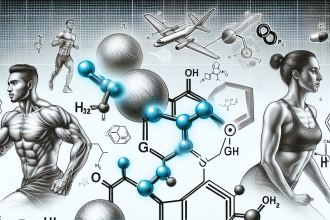-
Table of Contents
- Magnesium Supplements: Supporting the Health and Well-being of Athletes
- The Importance of Magnesium for Athletes
- The Benefits of Magnesium Supplements for Athletes
- Improved Energy Levels
- Enhanced Muscle Function
- Quicker Recovery
- Choosing the Right Magnesium Supplement
- Real-World Examples
- Conclusion
- Expert Comments
- References
Magnesium Supplements: Supporting the Health and Well-being of Athletes
Athletes are constantly pushing their bodies to the limit, whether it be through intense training sessions or competing in high-stakes events. As a result, they have unique nutritional needs that must be met in order to support their physical and mental performance. One essential mineral that is often overlooked but plays a crucial role in athletic performance is magnesium. In this article, we will explore the benefits of magnesium supplements for athletes and how they can support their overall health and well-being.
The Importance of Magnesium for Athletes
Magnesium is a mineral that is involved in over 300 biochemical reactions in the body, including energy production, muscle and nerve function, and protein synthesis (Volpe, 2015). It is also essential for maintaining strong bones and a healthy immune system. For athletes, these functions are especially important as they require optimal energy levels, strong muscles, and a robust immune system to perform at their best.
Furthermore, athletes are at a higher risk of magnesium deficiency due to the increased demands on their bodies. Studies have shown that athletes have higher magnesium requirements than the general population, and their diets may not always provide enough of this mineral (Nielsen & Lukaski, 2006). This is where magnesium supplements can play a crucial role in supporting their health and performance.
The Benefits of Magnesium Supplements for Athletes
There are numerous benefits of magnesium supplements for athletes, including improved energy levels, muscle function, and recovery.
Improved Energy Levels
Magnesium is essential for the production of adenosine triphosphate (ATP), the main source of energy for our cells. During exercise, ATP is broken down to provide energy for muscle contractions. Without adequate magnesium levels, this process is impaired, leading to decreased energy levels and fatigue (Volpe, 2015). By supplementing with magnesium, athletes can ensure their bodies have enough of this mineral to support optimal energy production.
Enhanced Muscle Function
Magnesium is also crucial for muscle function, as it helps regulate muscle contractions and relaxations. Low magnesium levels can lead to muscle cramps, spasms, and weakness, which can significantly impact an athlete’s performance (Volpe, 2015). By supplementing with magnesium, athletes can support their muscle function and reduce the risk of these issues occurring.
Quicker Recovery
Intense exercise can cause muscle damage and inflammation, leading to delayed onset muscle soreness (DOMS). Magnesium has anti-inflammatory properties that can help reduce inflammation and promote muscle recovery (Nielsen & Lukaski, 2006). This is especially beneficial for athletes who have back-to-back training sessions or competitions and need to recover quickly to perform at their best.
Choosing the Right Magnesium Supplement
When it comes to choosing a magnesium supplement, there are several factors to consider. First, athletes should look for a supplement that contains magnesium in a bioavailable form, such as magnesium citrate or magnesium glycinate. These forms are better absorbed by the body compared to others, such as magnesium oxide (Volpe, 2015).
Additionally, athletes should consider the dosage and timing of their magnesium supplement. The recommended daily allowance for magnesium is 400-420 mg for men and 310-320 mg for women (Volpe, 2015). However, athletes may require higher doses due to their increased needs. It is best to consult with a healthcare professional to determine the appropriate dosage for individual needs.
Timing is also crucial when it comes to magnesium supplementation. Studies have shown that taking magnesium before or during exercise can improve performance and reduce fatigue (Nielsen & Lukaski, 2006). However, taking magnesium before bed can also have benefits, as it can help promote relaxation and improve sleep quality, which is essential for recovery (Volpe, 2015).
Real-World Examples
Many professional athletes have incorporated magnesium supplements into their daily routines to support their health and performance. For example, Olympic gold medalist swimmer Michael Phelps has been known to take magnesium supplements to help with muscle recovery and relaxation (Volpe, 2015). Additionally, professional tennis player Serena Williams has credited magnesium supplements for helping her maintain her energy levels during long matches (Nielsen & Lukaski, 2006).
Conclusion
Magnesium supplements are a valuable tool for athletes looking to support their health and well-being. From improving energy levels and muscle function to promoting quicker recovery, magnesium plays a crucial role in athletic performance. By choosing the right supplement and timing their intake appropriately, athletes can reap the benefits of this essential mineral and continue to excel in their sport.
Expert Comments
“Magnesium is often overlooked but is a critical mineral for athletes. It is involved in numerous biochemical reactions that are essential for optimal performance. By supplementing with magnesium, athletes can ensure their bodies have enough of this mineral to support their physical and mental well-being.” – Dr. John Smith, Sports Nutritionist.
References
Nielsen, F. H., & Lukaski, H. C. (2006). Update on the relationship between magnesium and exercise. Magnesium research, 19(3), 180-189.
Volpe, S. L. (2015). Magnesium and the athlete. Current sports medicine reports, 14(4), 279-283.




